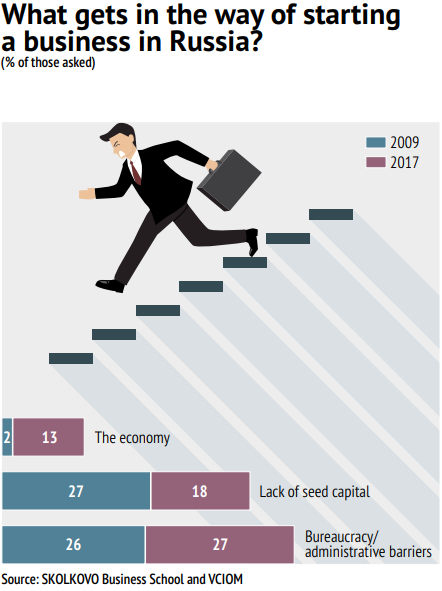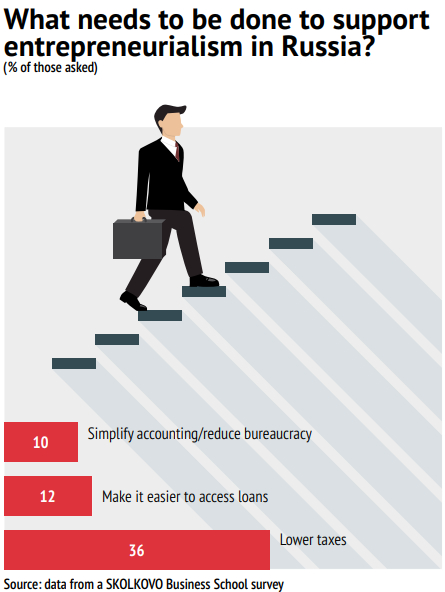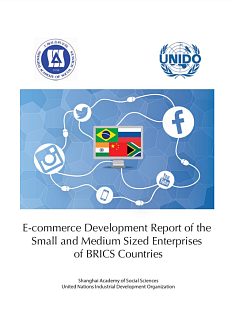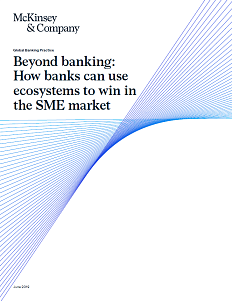While small and medium-sized businesses are the foundation of developed economies, in Russia they still play a relatively modest role. Andrey Sharonov, President of Moscow School of Management SKOLKOVO, talks about how Russians view entrepreneurship and what entrepreneurs think about the government, what separates a leader from a boss, and why businesses shouldnt operate in factory mode.
We are strongly oriented towards government
One of the major topics discussed at the Eastern Economic Forum is developing entrepreneurship. How should it be developed, in your opinion?
Theres one figure thats pretty hard to argue with the share of small business in GDP. In Russia, this figure is around 20%. And throughout the entire history of the new Russia, since entrepreneurialism was legalized here, it has not risen above 25%.
Developed countries create approximately half of their national wealth through small and medium-sized companies, with a figure of 50%, on average. And the share of SMEs in Chinese GDP, for example, is 61%.
If somebody only weighs half as much as the average person their age, that means that something isnt right. Its the same with undeveloped entrepreneurship. Its just a medical fact.
Delving further into the problem, if you look at the structure of small business, youll see that we have very few high-tech companies the kind that work at the interface of manufacturing and science (as in Germany, for example). This is the second layer of our problem with undeveloped entrepreneurship.
 What can be done to create more entrepreneurs?
What can be done to create more entrepreneurs?
A year ago, we conducted two independent studies in collaboration with the Russian Public Opinion Research Center (VCIOM) on attitudes towards entrepreneurship in Russia. We asked our own graduates and student entrepreneurs what support they would like to receive from the state. Three kinds of expectations were identified. The first related to financial support, including reduced taxes and increased access to loans and subsidies. The second was an independent judiciary. The third was a reduction in the number of audits.
To my mind, making these changes will have an incentivizing effect on those who are presently just thinking about becoming entrepreneurs.
One recent study showed a solid trend. Young people increasingly prefer to seek out government positions and posts in state corporations, looking for jobs as tax inspectors, police officers, Gazprom employees, and so on. Choices like these are a reflection of what we see around us every day, the stories that we read in the media and hear on the radio. We need to engage in a certain kind of propaganda telling people how to get started and what mistakes to avoid, and making people understand that entrepreneurs are respected and supported by the government.
Is it right to rely so much on the government?
Obviously, theres a degree of sink or swim involved and people need to be able to help themselves, but Russia is very much a statist country. We are strongly oriented towards government, and government is responsible for the regulatory environment in any country. Another important thing that entrepreneurs expect from the government is stability.
What do you mean exactly?
That we shouldnt keep changing the rules of the game so rapidly. Imagine you operate a railway and offer transport and travel services. You manage carriages, to put it crudely. Youve sold everything you had and bought three not very new, but perfectly good carriages that are 15 years old, and now want to use them to earn money. Youve written a business plan. The carriages take a long time to pay for themselves between 18 and 30 years. But suddenly, Russian Railways decide to write off carriages older than a certain age, because they could be a safety hazard, although yesterday they werent. You couldnt have known this when you bought your carriages. You had an asset that you invested your money into, and then you read in the paper that you no longer have the asset, its now scrap.
The specifics of the Russian Far East
Are there specific problems associated with developing entrepreneurialism in the Russian Far East?
I havent lived there myself, but what I hear from people who have lived there and who travel there is that large numbers of people are leaving, and moving instead to countries in East and Southeast Asia, or in many cases to Central Russia. Unfortunately, its the most able people who are leaving.
How can the outflow of people from the region be stopped?
My football coach used to say: «Fish look for deeper water, and people look for the fish.» The same can be applied to the Russian Far East, I think. The region has some disadvantages due to its remoteness from the rest of Russia. The administrative burden on the Russian Far East is two and a half times the national average. The reason is that strategic security is the priority, rather than entrepreneurial freedom and the investment climate. With respect to the number of supervisory measures affecting entrepreneurs, the situation is worse than the Russian average. But there should also be some obvious advantages there so that people will still stay.
And there are advantages. Theres the proximity to the Asia-Pacific region. Two billion people live within a threehour flight of Vladivostok. This means a huge market, supply and demand, and economic activity. Last but not least, it also means culture.
But there needs to be additional infrastructure to enable the region to become part of this enormous melting pot, participate in the distribution of labour, and reap the benefits.
This can be so much more than just trading in natural resources. Agriculture, logistics, clean water and air, education ours is no worse. We have things to offer that will make people want to live there.
What do you think about One Belt, One Road initiative?
It looks like it will become an opportunity for a large number of economic agents to get involved in projects oriented primarily towards trade between China and Southeast Asia on the one hand and Europe and the Middle East on the other. Experts have already counted USD 900 billion in investment in projects mentioned in the context of the initiative. Russia occupies a geographically favourable position here, as part of the silk road, and the investment capabilities of the Chinese are far above those of Russians in terms of the amount of capital involved.
Tell us about your involvement in the project.
One Belt, One Road initiative is addressed directly by our joint programme with Hong Kong University of Science and Technology (HKUST). It is no secret that the countries of Eurasia are key to the implementation of Chinas initiative. Our programme has the direct objective of preparing a new generation of Eurasian business leaders. It takes the form of an Executive MBA programme that ends in the award of a double diploma. It will be offered in several countries. Modules will be taught in Russia, China, Kazakhstan, Armenia, Israel, Switzerland, and the USA. Israel boasts the best culture for cultivating startups. Switzerland has made a name for itself in the hightech sector. The USA is the Mecca of innovation. As for the other countries, they are part of that same silk road. We believe that this will be an extremely effective international programme, and note the considerable interest of our partner HKUST Business Schools Executive MBA has been rated number one eight times by the Financial Times.
The most important thing for factories is to manufacture goods, and the most important thing for companies is to sell them
 And what can entrepreneurs learn at SKOLKOVO Business School?
And what can entrepreneurs learn at SKOLKOVO Business School?
A colleague of mine from the school recently conducted a study she was looking at the differences in management approaches between Russian and Chinese entrepreneurs. The Chinese progress quickly to the marketing and sales phase, before they have a good working model. They arent afraid to enter the market with an average-quality product, planning to simultaneously master the market and work to improve quality. Our entrepreneurs, on the other hand, believe that they arent yet good enough to enter the market, and so lose the advantage.
A long time ago, when I was still very young, an American entrepreneur asked me what the difference was between a factory and a company. I answered that I didnt know. He told me that the most important thing for factories was to manufacture goods, and the most important thing for companies was to sell them. Our entrepreneurs very often operate in factory mode. Theyve made something, and thats important, but sales and negotiations are the real challenge. Blabbering away all day what kind of work is that, you might ask? The thing is that if you keep your mouth closed, you might lose your job!
Im simplifying a bit, but this is very important. People overvalue hard skills and strongly undervalue soft skills negotiating, leadership, and emotional intelligence.
What skills are we most lacking? Surely theres no problem when it comes to leadership?
When it comes to bosses, were fine. Weve got a lot of them and theyre all great. But leadership is something a little different. Leadership is when you convince people to consider a job or project or goal that is important to you as their own. If youre successful, then your colleagues will work in a way that even a lot of money might not persuade them to. Thats leadership.
So entrepreneurs arent appreciating the importance...
...of working with people to create a corporate culture. Peter Drucker put it well: «(Corporate) culture eats strategy for breakfast». If you spit and stub cigarettes out on the wall, its at the very least extremely difficult to talk about respect for clients and staff. If thats the sort of corporate culture you have, then whatever strategy you might come up with, it wont catch on among the group. Thats why its important to start not with the strategy, but with eradicating this culture.
Can a lack of soft skills be described as the most significant shortcoming among entrepreneurs?
I think so, yes. Once again, it goes back to our statist society. We still have the primacy of the collective over the individual, and of the government over society. We swear out loud that this isnt so, and reject it on a rational level. That is our strategy. But at a subconscious level we are heirs to the ideology of the early twentieth century to the period of collectivization and industrialization in which every person was a cog. That is our corporate culture.
We believe that the product is more important than the corporate environment, and that individual people have no value. If we cant see eye-toeye with somebody, then we fire them! But as founder of the World Economic Forum Klaus Schwab says, we are slowly entering an era of talentism, in which the highest value is represented not by capital or the means of production, but by talent. And it is this that corporations and capital will be fighting for. Everything else is easy enough to obtain, but human brains that can come up with original solutions are a rarity.
Source: EEF 2018 Official Magazine






